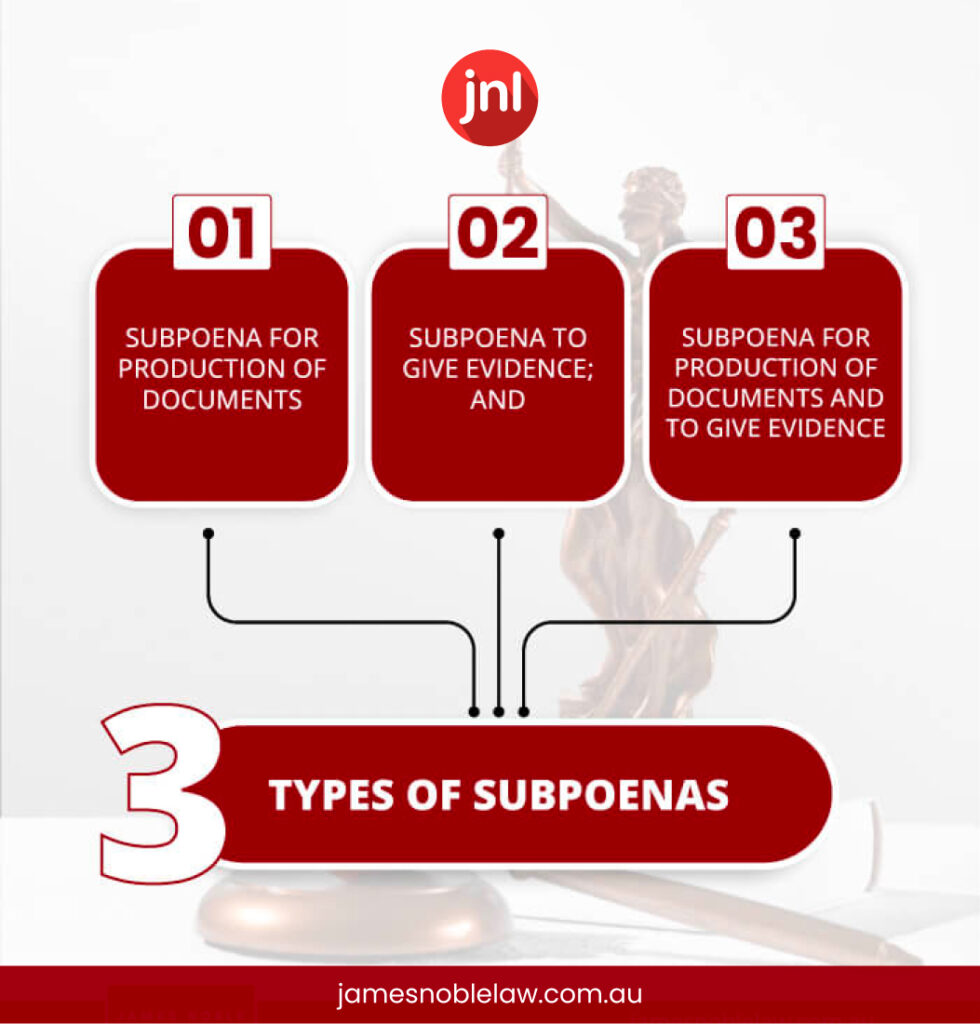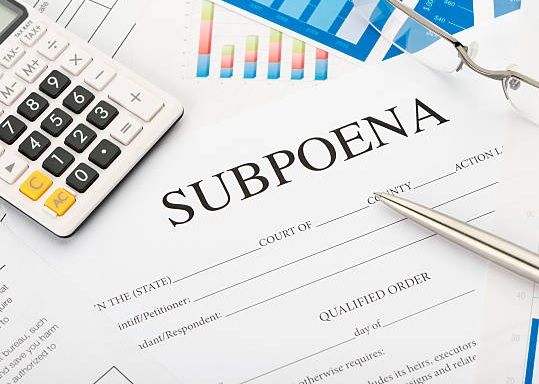
What is a Subpoena?
A ‘subpoena’ is a legal document issued by the Court at the request of a party. A subpoena compels a person to produce documents and/or give evidence at a hearing or trial.
 There are three types of subpoenas:
There are three types of subpoenas:
- Subpoena for production of documents;
- Subpoena to give evidence; and
- Subpoena for production of documents and to give evidence.
Documents or evidence produced under subpoena is protected by the principle of ‘implied undertaking’ (or legal promise) founded in the High Court decision of Hearne v Street [2008] HCA 36. This common law principle provides that production of and access to documents under subpoena is subject to an implied undertaking that those documents will not be used for any purpose other than the proceedings.
How do you issue a subpoena?
In family law matters, subpoenas are issued pursuant to rule 6.26 of the Family Law Rules 2021. Subpoenas must be filed at the Court registry where the matter is heard and cannot be e-filed on the Commonwealth Courts Portal.
You should provide the Court with three copies: one for yourself, one for the recipient, and one for the Court. Once filed, the subpoena must be served on each other party, any interested person, and any independent children’s lawyer in the proceeding.
Further information about forms, fees, and service of subpoenas can be found on the Federal Circuit and Family Court of Australia website.
What happens if you are served with a subpoena?
 In most cases, subpoenas come as a surprise and recipients will be unlikely to know what to do. The first thing to know is that ignoring subpoenas may result in sanctions for contempt of court, including arrest.
In most cases, subpoenas come as a surprise and recipients will be unlikely to know what to do. The first thing to know is that ignoring subpoenas may result in sanctions for contempt of court, including arrest.
On the other hand, over-enthusiastically complying with subpoenas and delivering every document in your possession to the court is also an inappropriate response.
An appropriate response is to carefully review the subpoena and understand the following:
- At which registry is it returnable?
- What is the time frame for compliance?
- What exactly is required by reading the schedule carefully.
- How are the documents to be delivered and to where?
- Was conduct money provided?
If a subpoena requires you to attend court to give evidence, the person serving the subpoena must give you conduct money sufficient for return travel between your place of residence or employment (as appropriate) and the Court.
The amount of conduct money must be at least $25.
A subpoena calling for a limited number of identifiable and uncontroversial documents that are in your possession and relevant to the proceedings should be complied with. The documents that you are required to produce will be listed in the schedule to the subpoena. The documents must be produced to the registry of the court by mail or in-person (or email if applicable), not the party who issued the subpoena, within the specified time frame.
Can you object a subpoena?

In Queensland, rule 414(8) of the Uniform Civil Procedure Rules 1999 provides that a subpoena can be objected to if there is a failure to identify documents with precision. However, it is unlikely that an objection on this basis could not be easily overcome by the issuing party amending the schedule to the subpoenas.
If there is not a ‘legitimate forensic purpose’ (LFP) for the documents sought under the subpoena, the subpoena can be objected to and may be set aside by the Court. In family law property matters, the Court must conduct a retrospective and prospective examination of the parties’ financial and non-financial contributions to the relationship and their current and future financial needs and capacities.
In parenting matters, the Court looks at the parties’ parenting capacities, with the best interests of the child as the paramount consideration. In this context, the threshold for what constitutes an LFP is much lower compared to other areas of law and there is often little hope of a successful objection to such subpoenas.
Can you get an extension of time for production?
In the event that you cannot produce the required documents within the stipulated time period, you should contact the issuing party and agree on a later date for production. The issuing party will then be required to attend court on the original production date and advise the Registrar of the newly agreed production date.
Need Legal Help?
If you are needing to issue a subpoena or have been served with a subpoena in a family law matter, please contact the Brisbane Family lawyers team at James Noble Law today for a FREE, no-obligation 20-minute consultation. To schedule an appointment with one of our Qualified and experienced Family lawyers Brisbane.
Find Brisbane family lawyers on Google Maps near you.
Helpful Family Law Documents & Guides
- A Guide to Children Negotiation and Family Law
- A Guide to Property & Family Law Act Paper
- A Guide to Alternative Dispute Resolutions
- A Guide to Preparing for the unthinkable
- A Guide to Collaborative Practice Paper
- A Guide to Separation in Family Law
- A Guide to Family Law Property
- A Guide to Dispute Resolution
- A-Z Collaborative Law eBook
- A Guide to Separation
- A Guide to Children
- Arbitration eBook


